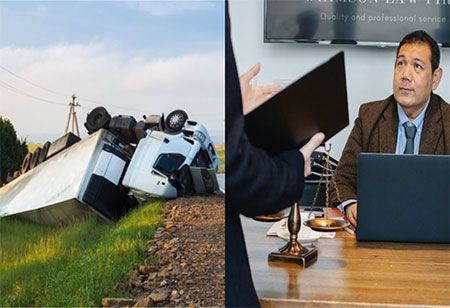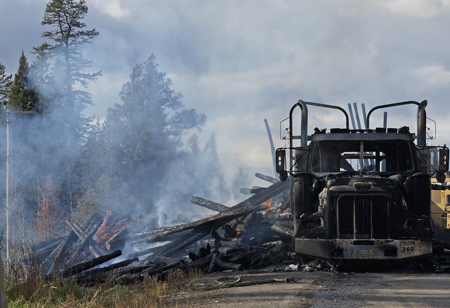
Imagine you're cruising down the highway when a massive truck cuts you off, causing a terrifying crash. You're hurt, your car is totaled, and medical bills are piling up. In this situation, you might be wondering if you have a case against the trucking company. The answer is yes, in many cases.
A tip to remember: never head into a case without an attorney by your side. Experts like DJC Law truck accident attorneys can help you fight against the trucking company and secure fair compensation for you.
Unlike regular drivers, trucking companies and their drivers are held to a stricter legal standard. They're responsible for the safety of everyone on the road. This means properly maintaining their vehicles, following strict driving rules, and ensuring drivers are well-rested and qualified. If they fail in these duties, and an accident occurs, you might have a legal claim.
Holding Them Accountable: Common Reasons to Sue
Here are some of the most common reasons why people sue trucking companies after an accident:
Improper Maintenance: Trucks are complex machines, and a mechanical issues like brake failure, tire blowouts, or steering problems can have disastrous consequences. If a malfunctioning part contributed to the accident, and the trucking company failed to properly maintain the vehicle, you might have a claim.
Improper Cargo Loading: Trucks haul a lot of stuff, and if it's not loaded or secured correctly, it can become dangerous. If cargo falls off the truck or shifts during transit, causing an accident, the trucking company could be responsible for not ensuring proper cargo management.
Trucking Regulation Violations: The trucking industry is heavily regulated for safety reasons. Companies and drivers must follow strict rules about driver fatigue (limiting how long they can drive), weight limits for cargo, and vehicle maintenance schedules. If a trucking company breaks these rules and it leads to an accident, you might have a legal case.
If you win a lawsuit against a trucking company, you could be entitled to compensation for various damages, helping you recover financially from the accident. Here's a breakdown of the two main categories of recoverable damages:
Economic Damages: These are the concrete costs associated with your accident, with clear dollar amounts attached. They aim to make you financially whole again. Here are some examples:
Medical Expenses: This covers all past, present, and future medical bills related to your injuries, like doctor visits, hospital stays, medications, rehabilitation, and any future surgeries you might need.
Lost Wages: A serious injury can prevent you from working and earning a living. You could recover compensation for lost wages due to your injuries, as well as any future lost earning capacity if you can't return to your previous job.
Property Damage: Did your car get totaled in the accident? You could recover compensation for repairs or replacement of your vehicle.
Non-Economic Damages: These are intangible losses that are more subjective and harder to quantify in dollar amounts. They aim to compensate you for the intangible losses caused by the accident. Here are some examples:
Pain and Suffering: Truck accidents can cause significant physical pain and discomfort. This type of compensation acknowledges the physical toll the accident has taken on you.
Emotional Distress: The accident and its aftermath can cause significant emotional distress, including anxiety, depression, and post-traumatic stress disorder (PTSD). This compensation recognizes the emotional impact of the accident.
The legal process after a truck accident can seem complex, but here's a simple roadmap to get you started:
Seek Medical Attention: Your health is the top priority. See a doctor right away to check for injuries, even if you don't feel any pain immediately.
Contact a Personal Injury Lawyer: An experienced lawyer can guide you through the legal process, investigate the cause of the accident, gather evidence, and negotiate a fair settlement with the insurance company.
Remember, throughout this process, consulting a qualified personal injury lawyer is crucial. They can provide personalized advice based on the specifics of your case and advocate for your best interests.
 Next Steps: Getting the Help You Deserve
Next Steps: Getting the Help You DeserveIf you've been injured in a truck accident, don't hesitate to seek medical attention and contact a personal injury lawyer as soon as possible. Here are some additional tips to remember:
Evidence Preservation: After the accident, if you're able to do so safely, take pictures of the scene, your vehicle damage, and any visible injuries. Ask any witnesses for their contact information. This documentation can be crucial evidence in your case.
Keep Detailed Records: Maintain a record of all medical bills, doctor visits, lost wages, and other accident-related expenses. Having a clear paper trail strengthens your claim.
Be Honest with Your Lawyer: During your consultation, be completely honest with your lawyer about the details of the accident and your injuries. Transparency is key to building a strong case.
The aftermath of a truck accident can be a difficult time. By understanding your legal options and the potential compensation you might recover, you can take the first steps towards recovery and hold the responsible parties accountable.
Remember, a qualified personal injury lawyer can be your strongest advocate throughout this process. Don't hesitate to seek legal help to ensure you get the justice and compensation you deserve.
We use cookies to ensure you get the best experience on our website. Read more...